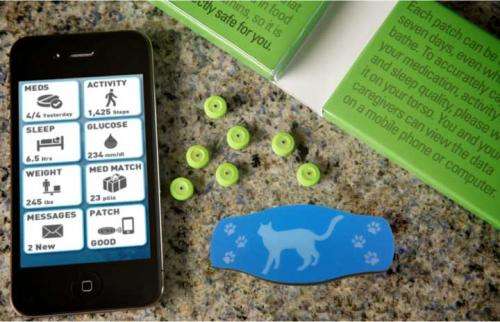January 18, 2012 report
British pharmacy chain announces roll-out of new smart pills loaded with microchip

(Medical Xpress) -- A new pharmaceutical program that many Britons might find literally hard to swallow, has been announced. Pharmacy chain Lloydspharmacy has partnered with American technology firm Proteus Biomedical to bring to the British public a product called Helius; a tiny microchip that is swallowed in pill form and whose purpose is to help remind patients to take their medications on time and to offer bio-feedback such as body temperature, heart rate and even sleeping patterns.
The microchip, which becomes active when subjected to water, can be either embedded directly in regular medication pills, or placed in a placebo meant only to deliver the pill to the stomach in conjunction with regular medication. In either case, the microchip, or "ingestible event marker" (IEM) as Proteus calls it, is powered by a thin film non-toxic battery. Once activated, the IEM sends a tiny uniquely modulated high frequency electrical signal throughout the body, using the body as a conduit, thus, no radio frequency is used. Instead, a patch is applied to the skin on the outside of the body to listen for bodily interactions with the electrical signal, allowing for measurement of the heart-beat rate, internal body temperature, respiration rate, posture and sleeping patterns. All of this information is relayed via Smartphone app to a web site that provides statistics in graph form. Thus, patients can simply check their chart to see if they have taken all of their pills or not. The information could also be sent to the doctor who prescribed the medication to see if it’s having the desired effect.
The whole idea is get patients to take all of their medications when they are supposed to be taken, which is a serious problem. The World Health Organization recently announced that it believes that as many as half the people in the world don’t take their medications correctly, putting themselves at risk.
What’s not clear is how long the microchip operates inside the body, and what happens to it once it dies. Is it digested, or is it flushed out into the sewer system wholly intact? And if it’s flushed, what happens to all those millions of chips that wind up in sewage treatment facilities?
Such questions appear to be beside the point at this juncture, as the real issue is whether people will buy into the new technology, and if they do, if it will help them take their mediation properly. On the one hand, it might help people live better or longer. On the other, it appears that such pill takers would have to wear the patch that reads the data all the time and would have to have their Smartphones near at hand constantly as well. There’s also likely to be privacy issues as patients would have to rely on promises made by corporations that may or may not be securing their medical histories as well as patients would expect.
© 2011 PhysOrg.com



















